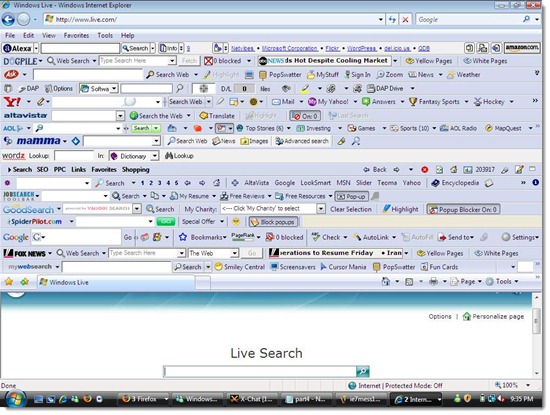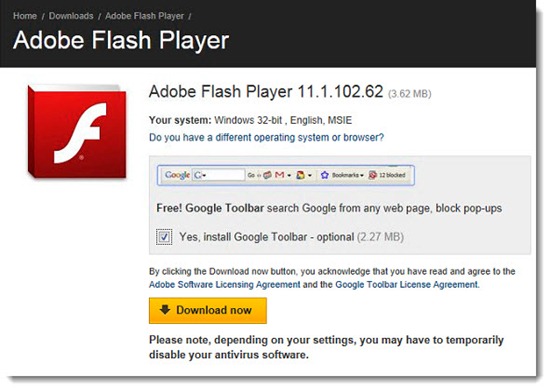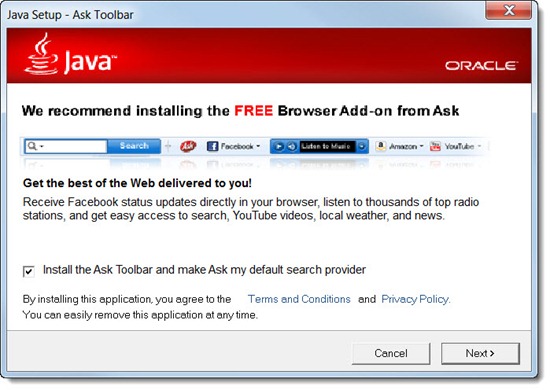We are under constant assault from advertisers seeking a foothold on our computers. We invite some of them into our lives voluntarily – every time you do a Google search or check your Facebook page, you’re making advertisers very happy (and making Google and Facebook exceedingly rich).
There is, however, a bit of advertising that you can control. Almost everyone accumulates toolbars that take up space at the top of Internet Explorer or Chrome or Firefox. Theoretically each one delivers useful services. “Keep in touch with the people you care about,” claims Google Toolbar. “Search and explore with Bing and earn great rewards” using the Bing Bar, according to Microsoft.
There are also less legitimate companies whose toolbars barely pretend to have any useful purpose, with buttons that lead to pathetic advertising sites. I cringe when I see “My Web Search” or “GoodSearch” or “Inbox Toolbar” or some of the others.
After a while your Internet browser begins to crash and the space for web pages begins to disappear.
The toolbars arrive by stealth when you’re not watching. They are the result of sneaky deals to include the toolbars when you install something unrelated. Most of them also hijack your browser home page and try to change your default search provider as well.
- If you’ve gotten an HP printer recently, you’ve probably picked up the Bing Bar along with a printer driver. The option to avoid the toolbar is deeply hidden in the printer setup program. Microsoft’s Bing Bar is almost the worst of the bunch, with cartoonish graphics and very little that makes it even remotely useful. Even worse, it takes 90-120 seconds to uninstall it, longer than almost any other program on your computer.
- Adobe currently bundles the Google Toolbar with Adobe Flash. Be alert for the checkmark to avoid junk software that is bundled with a program you’re installing!
I hope Sun Microsystems executives are ashamed that they made a deal to bundle the “Ask Toolbar” with Java. Really? The “Ask Toolbar” should be forced on everyone who installs Java? “Make Ask my default search provider”? Pfft. A pox on their houses.
REMOVING UNWANTED TOOLBARS
If you right-click at the top of Internet Explorer, you’ll see a dropdown list that includes installed toolbars. You can disable a toolbar by removing its checkmark on that list. There is a longer list under Tools / Manage Add-Ons, but that one is trickier because it includes useful things that you won’t recognize by name.
Disabling the toolbar makes it disappear from sight but leaves pieces of it on your computer. You want all traces to be gone.
Instead, open up Control Panel / Install Programs. Look down the list and ruthlessly remove anything with “Toolbar” in the name.
Understand what I’m saying! If you log into your Google account with the Google Toolbar and you use it to navigate Google services, use it with my blessing.
But if you have something at the top of the screen that appeared out of nowhere, it’s likely to be a waste of pixels. Reclaim your screen real estate and put that space to better use to show you more of each web page.
If you’re a client of mine, by the way, you likely don’t have any extra toolbars. I strike them down without mercy whenever I’m working on a computer.





We long ago gave up on IE. Do the same instructions work with Firefox?
The installed toolbars are tracked down in a different place in Firefox but uninstalling them from Control Panel works the same way. I look for Google Toolbar and Bing Bar, plus anything else with “Toolbar” in the name. (The less information you can find in Control Panel / Installed Programs, the more likely that it’s adware.) It’s also worth looking sideways at anything listed with the word “Search” in it. If it’s from a third party other than Microsoft, chances are good that it’s a way to direct your web browser to advertising sites.
Worth noting: if you have Windows Live Essentials installed on your computer, highlight it in Control Panel / Installed Programs and click on Change. In some cases the Bing Bar will be hiding there as well.
Good luck!